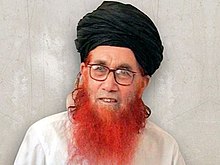
Back صوفي محمد Arabic Soofi Mohammed French Sufi Mohammad bin Alhazrat Hassan NB صوفی محمد PNB صوفی محمد Pashto/Pushto صوفی محمد Urdu
Sufi Muhammad صوفی محمد | |
|---|---|
 | |
| Founder and 1st Emir of Tehreek-e-Nafaz-e-Shariat-e-Mohammadi | |
| In office 1992–2002 | |
| Preceded by | Position created |
| Succeeded by | Maulana Fazlullah |
| Personal life | |
| Born | 1933 |
| Died | (aged 86)[1] Swat, Khyber Pakhtunkhwa, Pakistan |
| Children | At least one daughter |
| Religious life | |
| Religion | Islam |
| Denomination | Sunni |
| Jurisprudence | Ḥanbalī |
| Creed | Atharī[2] |
| Movement | Salafīyyah[3] Wahhābiyyah[4] |
| Military career | |
| Allegiance | |
| Years of service | 1980s–2002 |
| Rank | Emir (TNSM) |
| Battles / wars | |
Sufi Muhammad bin Alhazrat Hassan (Urdu: صوفی محمد بن الحضرت حسن; born 1933 – 11 July 2019) was a Pakistani Sunni Islamist cleric and militant, and the founder of Tehreek-e-Nafaz-e-Shariat-e-Mohammadi (TNSM), a militant group (declared a terrorist outfit and banned in 2002) vying for implementation of Sharia in Pakistan.[5][6][7][8] It operated mainly in the Dir, Swat, and Malakand districts of Khyber-Pakhtunkhwa.[7]
Sufi Muhammad was jailed for sending thousands of volunteers to Afghanistan to fight the U.S. intervention in 2001.[9] However, he was freed in 2008 after he renounced violence.[10][11]
He was the father-in-law of Mullah Fazlullah, who assumed the leadership of TNSM during Sufi's imprisonment.[7][9][12]
He was described by BBC as a "follower" of Saudi Arabia's Wahhabi Salafist Islamic school of thought,[13] and by the Jamestown Foundation as one of the "active leaders" of Jamaat-e-Islami in the 1980s.[14]
- ^ "Controversial cleric Sufi Muhammad passes away". Express Tribune. 11 July 2019.
- ^ Halverson, Jeffry R. (2010). Theology and Creed in Sunni Islam: The Muslim Brotherhood, Ash'arism, and Political Sunnism. Palgrave Macmillan. p. 48. ISBN 9781137473578.
- ^ Brown, Jonathan A.C. (2009). Hadith: Muhammad's Legacy in the Medieval and Modern World. Oneworld Publications (Kindle edition). p. 245.
- ^ Armstrong, Karen (27 November 2014). "Wahhabism to ISIS: how Saudi Arabia exported the main source of global terrorism". New Statesman. London. Archived from the original on 27 November 2014. Retrieved 8 September 2020.
- ^ Lakshman, Kanchan (9 July 2003). "Deep roots to Pakistan's sectarian terror". Asia Times. Archived from the original on 16 April 2004. Retrieved 19 February 2009.
- ^ Fair, C. Christine (1 March 2007). "The educated militants of Pakistan: implications for Pakistan's domestic security" (PDF). Contemporary South Asia. 16 (1): 99–100. doi:10.1080/09584930701800446. S2CID 143810428. Retrieved 18 February 2009.
- ^ a b c "Tehreek-e-Nafaz-e-Shariat-e-Mohammadi (Movement for the Enforcement of Islamic Laws)". South Asia Terrorism Portal. Retrieved 18 February 2009.
- ^ Jan, Delawar (17 February 2009). "Nizam-e-Adl Regulation for Malakand, Kohistan announced". The News International. Archived from the original on 16 June 2009. Retrieved 30 April 2009.
- ^ a b Khan, Riaz (27 October 2007). "Inside rebel Pakistan cleric's domain". USA Today. Retrieved 15 February 2009.
- ^ "Top Pakistani militant released". BBC News. 21 April 2008. Retrieved 14 October 2023.
- ^ Toosi, Nahal (15 February 2009). "Taliban to cease fire in Pakistan's Swat Valley". Yahoo News. Archived from the original on 16 February 2009. Retrieved 15 February 2009.
- ^ "Pakistan agrees Sharia law deal". BBC News. 16 February 2009. Retrieved 14 October 2023.
- ^ "Pakistan's militant Islamic groups". BBC News. 13 January 2002. Retrieved 16 November 2014.
- ^ Cite error: The named reference
nasirsawas invoked but never defined (see the help page).